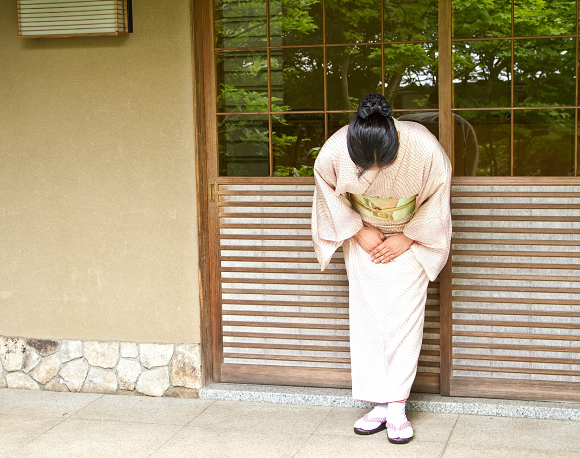
Warmhearted hospitality plus unforgiving customers equals the world’s highest service standards.
Japan has become world-famous for its incredibly polished customer service, which isn’t something you’ll find only at premium-priced hotels and leisure resorts. Just about any shop or restaurant you go to in Japan, right down to convenience stores and fast food joints, will be staffed by courteous clerks and servers.
To explain this phenomenon, sociologists often point to the importance of respect and humility that are so deeply ingrained in Japanese culture. In our increasingly cynical world, it’s refreshing to see the concept of “you should treat the people who support your livelihood with polite kindness” be treated as such an obvious truth, but it turns out there’s also a less warm and fuzzy reason for Japan’s stellar service standards.
American Express International recently conducted a survey, collecting responses from 1,000 people each in Canada, Hong Kong, India, Italy, Japan, Mexico, Singapore, the U.K., and the U.S. regarding their customer service expectations. Specifically, researchers asked the participants how many times they’d have to experience poor customer service from a company before taking their future business elsewhere, which produced some startling data in the strictest category.
See if you can spot the outlier:
I take my business elsewhere after one bad service experience.
● Canada: 32 percent
● Hong Kong: 23 percent
● India: 31 percent
● Italy: 32 percent
● Japan: 56 percent
● Mexico: 30 percent
● Singapore: 33 percent
● U.K.: 37 percent
● U.S.: 32 percent
Despite significant cultural differences, the strictest customers made up around 30 percent of most nations’ totals (with Hong Kong being slightly more forgiving and the U.K. a bit more demanding). In Japan, though, the majority, 56 percent, of the respondents said that after one case of bad customer service, they’ll simply spend their money somewhere else from then on.
Taken from the perspective of a business owner, a single service screw up means you can probably kiss that customer goodbye permanently, so employee training and work process management has to make service a priority if the business is going to have any chance of succeeding. Business owners can’t count on their patrons shrugging their shoulders and coming back again after even one brusque interaction with a frontline worker. In a way, it’s a quintessentially Japanese way of dealing with the problem, keeping with the society’s distaste for direct confrontation.
▼ It’s the economic equivalent of going on a date with someone and then saying “Let’s just be friends.”
In regards to the survey, Shunichi Nozaki, a researcher with Rikkyo University’s graduate school of business design, commented that Japanese consumers are much more likely to write off a business entirely than to complain about bad service. The stringent standards of customers in Japan even creates a sort of self-perpetuating cycle. Businesses know they have to deliver on service, which raises the bar for entire industries, and that high level of service makes Japanese consumers’ expectations all the higher. The result is that bad service stops being something people are resigned to, and becomes a startling blemish on the experience.
This can eventually even sink into the psyches of ex-pats in Japan. About half a year ago, my wife and I went out to dinner at a moderately priced restaurant in Yokohama. The waiter ignored us, and the owner/chef become blusteringly angry when we asked a simple question about the menu. We haven’t been back since, and we probably never will be, since there’s a nearly limitless number of alternatives that do treat their customers well.
Source: Peachy via Jin
Top image: Pakutaso
Insert images: Pakutaso


 Sometimes Japanese customer service is so good, it’s hilarious
Sometimes Japanese customer service is so good, it’s hilarious Top 10 acts of customer service that Japanese men would rather do without
Top 10 acts of customer service that Japanese men would rather do without Survey finds only six percent of Japanese workers motivated, seventh lowest in the world
Survey finds only six percent of Japanese workers motivated, seventh lowest in the world Indian curry restaurant worker in Tokyo warms our heart with amazingly sweet customer service
Indian curry restaurant worker in Tokyo warms our heart with amazingly sweet customer service Nintendo takes steps to protect staff from growing problem of customer harassment
Nintendo takes steps to protect staff from growing problem of customer harassment Survey finds that one in five high schoolers don’t know who music legend Masaharu Fukuyama is
Survey finds that one in five high schoolers don’t know who music legend Masaharu Fukuyama is Rental grandma service growing in Japan, can help cook or break up with boyfriends
Rental grandma service growing in Japan, can help cook or break up with boyfriends Ghibli’s Kiki’s Delivery Service returns to theaters with first-ever IMAX screenings and remaster
Ghibli’s Kiki’s Delivery Service returns to theaters with first-ever IMAX screenings and remaster Saitama is home to the best strawberries in Japan that you’ve probably never even heard of
Saitama is home to the best strawberries in Japan that you’ve probably never even heard of We deeply regret spending five hours on this artistic Japanese island (we should have spent more)
We deeply regret spending five hours on this artistic Japanese island (we should have spent more) Starbucks Japan’s latest limited-edition Frappuccino tastes better with a customisation
Starbucks Japan’s latest limited-edition Frappuccino tastes better with a customisation Family Mart’s Shibuya Cat Street shop hosts first-ever rescue cat photo exhibition for Cat Day
Family Mart’s Shibuya Cat Street shop hosts first-ever rescue cat photo exhibition for Cat Day Our reporter tries nuikatsu for the first time, but is he too old for this otaku lifestyle hobby?
Our reporter tries nuikatsu for the first time, but is he too old for this otaku lifestyle hobby? Skyscraper sized Pokémon cards to appear in Tokyo all year long in Tocho projection mapping event
Skyscraper sized Pokémon cards to appear in Tokyo all year long in Tocho projection mapping event Japan has only one airport named after a samurai, so let’s check out Kochi Ryoma【Photos】
Japan has only one airport named after a samurai, so let’s check out Kochi Ryoma【Photos】 The 10 most annoying things foreign tourists do on Japanese trains, according to locals
The 10 most annoying things foreign tourists do on Japanese trains, according to locals Starbucks Japan releases new sakura goods and drinkware for cherry blossom season 2026
Starbucks Japan releases new sakura goods and drinkware for cherry blossom season 2026 Is Sapporio’s Snow Festival awesome enough to be worth visiting even if you hate the snow? [Pics]
Is Sapporio’s Snow Festival awesome enough to be worth visiting even if you hate the snow? [Pics] Japan has trams that say “sorry” while they ride around town…but why?
Japan has trams that say “sorry” while they ride around town…but why? Tokyo Skytree turns pink for the cherry blossom season
Tokyo Skytree turns pink for the cherry blossom season Highest Starbucks in Japan set to open this spring in the Tokyo sky
Highest Starbucks in Japan set to open this spring in the Tokyo sky Japan’s new “Cunte” contact lenses aren’t pronounced like you’re probably thinking they are
Japan’s new “Cunte” contact lenses aren’t pronounced like you’re probably thinking they are Shibuya Station’s Hachiko Gate and Yamanote Line stairway locations change next month
Shibuya Station’s Hachiko Gate and Yamanote Line stairway locations change next month Yakuzen ramen restaurant in Tokyo is very different to a yakuza ramen restaurant
Yakuzen ramen restaurant in Tokyo is very different to a yakuza ramen restaurant Starbucks Japan adds new sakura Frappuccino and cherry blossom drinks to the menu
Starbucks Japan adds new sakura Frappuccino and cherry blossom drinks to the menu Japan’s newest Shinkansen has no seats…or passengers [Video]
Japan’s newest Shinkansen has no seats…or passengers [Video] Foreigners accounting for over 80 percent of off-course skiers needing rescue in Japan’s Hokkaido
Foreigners accounting for over 80 percent of off-course skiers needing rescue in Japan’s Hokkaido Super-salty pizza sends six kids to the hospital in Japan, linguistics blamed
Super-salty pizza sends six kids to the hospital in Japan, linguistics blamed Starbucks Japan unveils new sakura Frappuccino for cherry blossom season 2026
Starbucks Japan unveils new sakura Frappuccino for cherry blossom season 2026 Foreign tourists in Japan will get free Shinkansen tickets to promote regional tourism
Foreign tourists in Japan will get free Shinkansen tickets to promote regional tourism Take a trip to Japan’s Dododo Land, the most irritating place on Earth
Take a trip to Japan’s Dododo Land, the most irritating place on Earth Naruto and Converse team up for new line of shinobi sneakers[Photos]
Naruto and Converse team up for new line of shinobi sneakers[Photos] Is China’s don’t-go-to-Japan warning affecting the lines at a popular Tokyo gyukatsu restaurant?
Is China’s don’t-go-to-Japan warning affecting the lines at a popular Tokyo gyukatsu restaurant? Survey asks foreign tourists what bothered them in Japan, more than half gave same answer
Survey asks foreign tourists what bothered them in Japan, more than half gave same answer Japan’s human washing machines will go on sale to general public, demos to be held in Tokyo
Japan’s human washing machines will go on sale to general public, demos to be held in Tokyo Starbucks Japan releases new drinkware and goods for Valentine’s Day
Starbucks Japan releases new drinkware and goods for Valentine’s Day We deeply regret going into this tunnel on our walk in the mountains of Japan
We deeply regret going into this tunnel on our walk in the mountains of Japan Studio Ghibli releases Kodama forest spirits from Princess Mononoke to light up your home
Studio Ghibli releases Kodama forest spirits from Princess Mononoke to light up your home Major Japanese hotel chain says reservations via overseas booking sites may not be valid
Major Japanese hotel chain says reservations via overseas booking sites may not be valid Put sesame oil in your coffee? Japanese maker says it’s the best way to start your day【Taste test】
Put sesame oil in your coffee? Japanese maker says it’s the best way to start your day【Taste test】 No more using real katana for tourism activities, Japan’s National Police Agency says
No more using real katana for tourism activities, Japan’s National Police Agency says Japanese people least likely to talk to strangers or offer help on airplanes, survey finds
Japanese people least likely to talk to strangers or offer help on airplanes, survey finds Five reasons there’s no tipping at restaurants in Japan
Five reasons there’s no tipping at restaurants in Japan Nintendo’s “God-like” customer service warms hearts again, this time helping a husband in Japan
Nintendo’s “God-like” customer service warms hearts again, this time helping a husband in Japan Overly honest taiyaki restaurant flooded with customers after admitting to reducing sweet beans
Overly honest taiyaki restaurant flooded with customers after admitting to reducing sweet beans “The one and only way to make people in Japan take more vacation time”
“The one and only way to make people in Japan take more vacation time” Wait, you can still send telegrams in Japan? Why? And is it time to shut the service down?
Wait, you can still send telegrams in Japan? Why? And is it time to shut the service down?